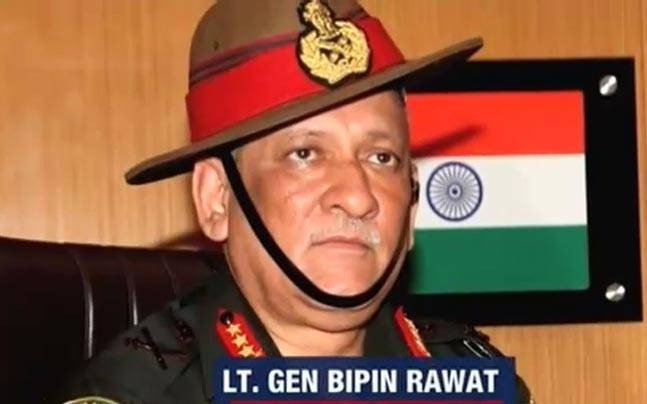
The Indian Army chief General Bipin Rawat’s statements often come thick and fast, but they’re usually newsworthy. Recently however, General Rawat was less focussed on hurling threats at Pakistan, and instead sought to clarify that a report in The New York Times which alleged he had been quietly approached by the Pakistani Army chief General Qamar Bajwa for talks, was completely incorrect. The media house then reported that General Bajwa reached out to his counterpart well before the general elections that brought Prime Minister Imran Khan to power. It then went to state rather curiously that “a key objective for Pakistan in reaching out to India is to open barriers to trade between the countries, which would give Pakistan more access to regional markets. Any eventual peace talks over Kashmir are likely to involve an increase in bilateral trade as a confidence-building measure”.
Now that’s curious. While the military in Pakistan is all-encompassing in its “interests” at a national level, it is hardly General Rawat’s brief to talk trade with his counterpart. It is undoubtedly true that Pakistan’s chief is now showing a healthy interest in trade and investment issues, since he is fast realising that the key to getting a better deal for his institution lies in reviving the lagging Pakistani economy. His speech to the Pakistan Chambers of Commerce and Industry in October 2017 underlined his concern at Pakistan’s “sky-high debt”, warning that “the region will sink or sail together. I want to convey to our neighbours to the east and to the west that our destinies are inextricably linked”. At the end of his speech, Bajwa added that the springboard for this shared development was the China-Pakistan Economic Corridor (CPEC). In other words, the chief seemed to be not only opting for opening up trade with neighbours, he was also selling the CPEC as a vehicle to do so.
That’s a lot for any army chief to say. Certainly, General Rawat, for all his eloquence and all too frequent chats with the press, can hardly draw such grand designs without clearance from half a dozen ministries. So the question is: What was the objective of the Pakistani Army chief in reaching out to his counterpart, when he would know full well that the Indian Army is very properly (and rigorously) bounded about by the civilian bureaucracy and the political leadership as befits a democracy? Military to military” talks — or ‘mil to mil” as they are called — are hardly ever precursors to a formal political dialogue.
It’s usually the politicos who sit together first, and then later — much later — the militaries sit down and talk to each other, usually on subjects linked to their domains. None of this is to say that militaries don’t talk to each other at all. But these issues are usually single subject meetings: like flag meetings to discuss border violations. For instance, a flag meeting at the Brigade-level was held in Poonch just two months ago, to discuss “how to strengthen the ceasefire”. That’s politesse. The reality is that the one probably inflicted one too many losses on the other, and there was a decision to fend off any possible escalation. That’s fairly standard stuff, and hardly the kind of reaching out that the Pakistani chief has in mind.
While considering the Pakistani Army chief's motives, the underlying fact remains that talking to the centre of power in Pakistan is very much in India’s interest. That just about everyone else sees it as in their respective interest is apparent in the fact that every foreign diplomat worth his salt will make his bow to the civilian leadership, and then hasten to army headquarters to get the real lowdown on what’s possible and what’s not with regard to a bilateral relationship on in wheeling and dealing on Afghanistan.
So while agreeing the ‘mil to mil’ talks are desirable, the problem remains how to get it off the ground in a situation where the politicians can't (or won't) talk to each other. In such a scenario, it is possible for the two chiefs to meet quietly at another location in much the same way as the two National Security Advisors of India and Pakistan have met in Bangkok and other such convenient cities. Alternatively, they could meet at a location where both army chiefs are present in an official capacity. There is no shortage of locations. The point is what subject they are to discuss.
NSAs on both sides can and do talk freely. But with all due respect, the Indian Army chief is hardly capable of having dialogue with authority on any other subject other than war-making or its avoidance. Other than that, the only other subject that could possibly be discussed is Kashmir, which the army knows and knows well. And in the final analysis, that is all there is to discuss: not in its substance, but quite literally in its terms of reference.
In other words, is Pakistan willing to go ahead with resolution of Sir Creek for instance, and open up trade while putting aside the issue of Kashmir? It’s a black and white situation, with the Indian Army chief only required to assess his opposite number’s position on this vital question. Other add-ons — like Indian involvement in CPEC — has to await entirely separate dialogues, probably with the Chinese rather than Islamabad.
And finally, while in Pakistan the army decides what it is going to talk about, in India it is the bureaucracy that takes the final call. So the actual question is whether any bureaucrat worth his sacrosanct file will allow this kind of leeway to a rather more than loquacious army chief. That answer is probably a resounding 'no'. That’s regrettable. Talking to the top is always a good idea, even if you have to crane your neck while doing it.


.jpeg)

